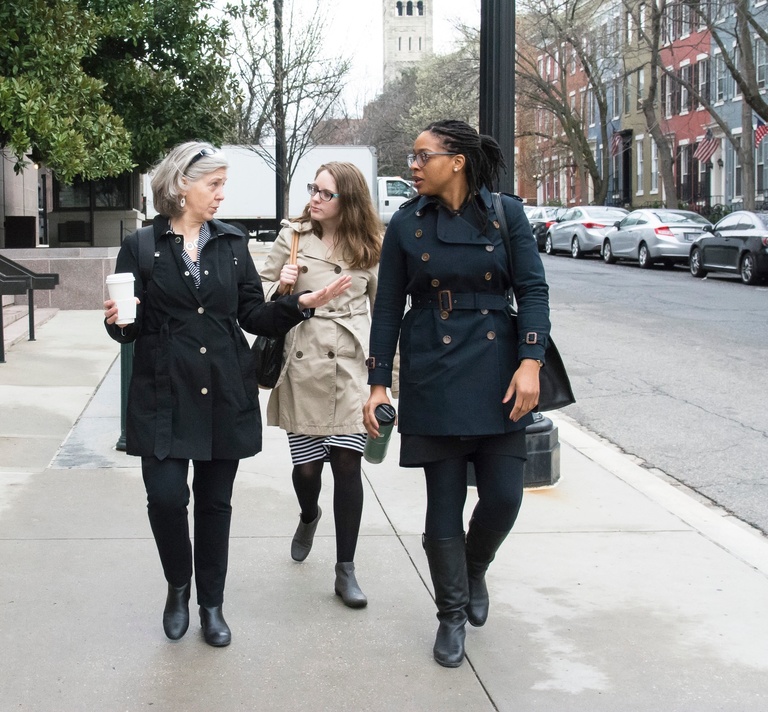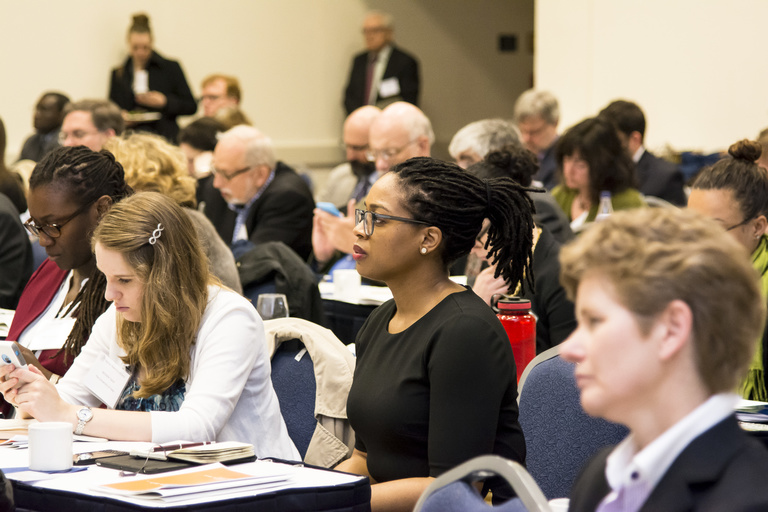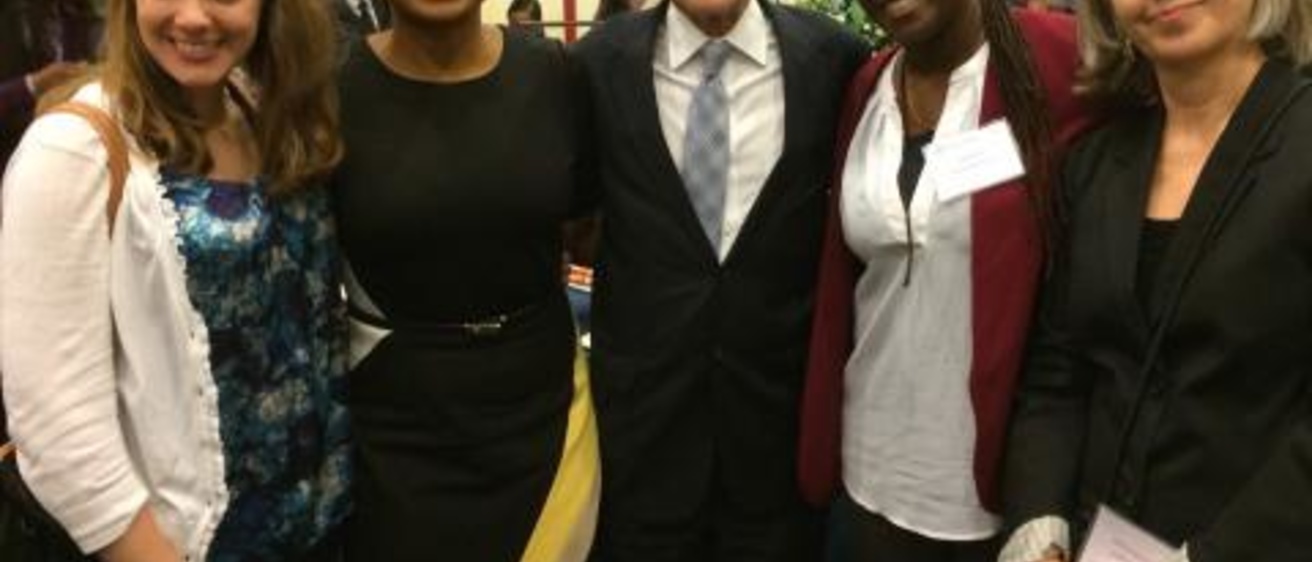Did you know that more people go to museums each year (850 million) than to all major league sports events and theme parks combined? Or that people with double majors up earnings by 2.3% while a double major that combines the arts, humanities, or social sciences with business or STEM can increase lifetime earnings up to 50%?
Well, neither do most people, including elected officials Iowans send to Washington. That’s why the University of Iowa is a member of the National Humanities Alliance (NHA). Each spring, representatives from the UI join colleagues across the country for NHA Advocacy Day. This year, three UI graduate students headed to Washington along with Obermann director Teresa Mangum.
Enriching Our Democracy
The two-day event kicked off with National Endowment for the Humanities Chairman “Bro” Adams (shown above at a reception on Capitol Hill with our UI delegation). He previewed a soon-to-be-announced grant for faculty in the humanities and STEM to create courses together.
Next, distinguished speakers showed how history, languages, literature, philosophy, and religious studies enrich daily life, thriving communities, and a vibrant democracy.
Scott Samuelson, professor of philosophy and humanities at Kirkwood Community College here in Iowa City, discussed the civic value of the humanities. Nicholas Allen, director of the University of Georgia humanities center, traced a “humanities life cycle,” including two critical stages: “public engagement” and “creating a thinking culture.”

Dianne Harris, dean of the University of Utah College of Humanities, energetically promotes the humanities on her campus. How? Collaboration—across departments, with colleagues in STEM, and with learned societies. Highlight prizes and awards for students and faculty, she suggested. And argue for full funding of humanities research, using data from sites like Humanities Indicators.
Practical Conversation and Congressional Meetings
Panelists also offered career advice. Employers are increasingly concerned about ethics, said Andrew Cullison of DePauw University. An unexpected “ROI” (Return on Investment) for humanities students is that these classes “cultivate the capacity for moral reasoning.” Where are those jobs? Answers abound on the Arts AH21CW (Arts and Humanities in the 21st-Century Workplace) website hosted by Union College Spanish and Hispanic professor Christine Henseler.
The future of graduate education also inspired lively discussion. Jim Grossman, executive director of the American Historical Association, spoke on behalf of historians who seek careers in the cultural and business sectors as well as higher education. He invited the audience to use the AHA’s Career Diversity for Historians website resources. Rosemary Feal, Executive Director of the Modern Language Association, shared additional resources at Connected Academics: Preparing Doctoral Students of Language and Literature for a Variety of Careers.
UI faculty and students working with incarcerated people would be encouraged by the final session. Founder Max Kenner showed how education is saving lives through the Bard Prison Initiative. The project gained national attention recently when a group of incarcerated BPI students defeated the Harvard debate team.
By day two, the UI delegation was eager to visit the offices of Iowa senators and legislators. (Seen here talking with James Rice, aid to Senator Chuck Grassley). All across Capitol Hill, these whip smart graduate students shared their research, plans, and passions—advocacy in action.
 Meet Our Graduate Student Delegation
Meet Our Graduate Student Delegation

- A PHD candidate in History and Obermann Graduate Institute alum, Noaquia Callahan (pictured left) is now a Fellow at the German Historical Institute in Washington, DC. Her dissertation asks how race, gender, and citizenship affected foreign policy at the turn of the 20th century. Noaquia urged support for Fulbright scholarships, recalling her life-changing study abroad. Meeting representatives, she discovered, “personalizes the issues that we care so deeply about – thus helping officials make better informed decisions regarding policies that will maintain support for the humanities.” She added: “I left the NHA Advocacy Day with a new perspective on the intellectual labor involved in conveying the usefulness of the humanities to every aspect our lives. I learned that this work will be most effective through collaboration across humanity fields and coalition building with outside disciplines.”
- Sylvea Hollis, also a PHD student in History and Graduate Institute alum, describes her dissertation as a cultural history of the African American insurance movement in the Jim Crow South. Her work shows how race, gender, and risk management has shaped black community life. Using examples from her current position at the American Alliance for Museums, Sylvea offered legislative staff concrete reasons to fund museums.
- Michelle Taylor’s dissertation traces our attachment to pets to Victorian literature and culture. As a graduate student in English, Michelle has worked on digital humanities projects. That experience led to a position at the Virginia Humanities Foundation. Michelle’s reflections sum up the value of membership in NHA: “While we all inherently know that the work we do in the humanities is valuable, the talks at NHA Advocacy Day gave me a toolkit for explaining to others why it's valuable. Linking, for instance, funding for studying abroad to issues of national security and international commerce helps those outside the humanities understand how our fields are every bit as crucial the STEM disciplines.” In the months before an election, said Michelle: “We were reminded how much the humanities factored into our nation's sense of what it means to be a citizen. Liberal education has always been associated with the rights and liberties of the people and the creation of democracy in which members are well-educated and culturally literate.”
